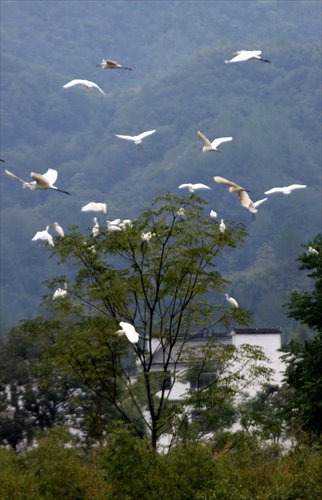HOME >> SCI-TECH
China weighs eco-compensation
Source:Xinhua-Global Times Published: 2013-12-15 20:13:01

Egrets are seen flying at the bank of the Xin'an River in Anhui Province in September. The downstream Zhejiang Province will pay Anhui millions of yuan if the water reaches the quality standard by 2015. Photo: CFP
Chu Chenglong, 56, never imagined that one day he would not be able to farm fishes.
Starting March this year, more than 60 of Chu's fish ponds, along with those of other aquiculturists, were removed from Foziling Reservoir in Huoshan county, East China's Anhui Province.
The reservoir feeds the provincial capital Hefei, 140 kilometers away and the quality of the water affects thousands of people's drinking water.
Chu received 300,000 yuan in compensation from the local government and has no complaints. Like Chu, more than 200 people who used to culture fish in the reservoir received as much as 600,000 yuan compensation.
Decades of industrialization and double-digit growth have left the country badly polluted, prompting China to speed up ecological protection and drop its pursuit of economic growth at all costs.
Smog, soil, water
In a key Communist Party of China (CPC) meeting last month, the Party vowed to establish a sound system to protect the country's ecological environment.
The road map released after the meeting proposed a "red line" for ecological protection, implementing a system of paid-for use of resources and ecological compensation.
Analysts say harmful smog, contaminated soil and poisoned water supplies demand a valid system to protect the environment.
"The red line is to limit economic development of environmentally vulnerable regions, such as river sources," said Xia Guang, director of the Policy Research Center for Environment and Economy under the Ministry of Environmental Protection.
In fact, some regions including Jiangsu Province in East China have already drawn their own red line. In Jiangsu, the conservation area takes up more than 20 percent of provincial land.
In Northwest China's resource-rich Qinghai Province, half of the land is protected. Gold mining was banned across the province except for two gold mines in Baima county and one in Chingdu county.
"Once a region is declared a protected area, local development should be achieved by ecological compensation," Xia said.
In a pilot program, the fund for protecting the Xin'an River is 500 million yuan ($82 million) a year. The river rises in Anhui Province and flows to Zhejiang. Anhui and Zhejiang provinces both contribute 100 million yuan to the program.
If the water reaches the quality standard by 2015, then downstream Zhejiang Province will pay Anhui 100 million yuan. If not, Anhui will pay Zhejiang 100 million yuan. Regardless of water quality, Anhui will receive 300 million yuan each year from the central government in compensation.
The program has been running for two years and the water quality remains excellent and stable, according to Nie Weiping, chief of Xin'an environmental protection bureau.
"If there were no compensation mechanism, the protection of the Xin'an River would not be so thorough and systematic," he said. "The ecological compensation in November's communiqué was a highlight.
"However, the content of the compensation so far is still narrow. For example, maintenance and opportunity cost are not included. Hopefully compensation contents will be expanded in the future."
Growth dilemma
Eco-construction has become a bottleneck for growth, making the central government's resolution to build a protection system crucial, said Meng Wei, dean of the Chinese Research Academy of Environmental Sciences in Beijing.
The drawing of an ecological red line is of great significance to China, as the country's development and people's livelihood are severely constrained by resource shortages, plus the pollution and the destruction of the environment, Pan Jiahua, director of the Institute for Urban and Environmental Studies at the Chinese Academy of Social Sciences, told media.
Speaking of reforms in management of the environment, Pan interpreted the market's "decisive" role in allocating resources.
"The environment is also a kind of resource, including water and air. For such resources, the market should play its decisive role, which means government intervention should be lessened," he was quoted as saying.
The supervision role of government should be improved and strengthened. Explicit legal institutions and mechanisms should also be constructed, helping ensure smooth functioning of government and market, he said.
China's central authorities have decided not to press local governments located in ecologically fragile areas to pursue economic growth regardless of environment deterioration, according to the reform road map released by the CPC.
"China cannot be like developed countries," said Xie Zhenhua, vice chairman of the China's National Development and Reform Commission.
China's environmental problems sprouted up over 30 years, he noted, while it took industrialized nations more than two centuries to fix theirs.
The international division of labor led to China receiving many polluting industries from developed countries, Xinhua commentators noted. Few chances remain for China to transfer these sectors abroad.
With this in mind, tackling pollution in China and many other developing countries requires more determination and courage than that required of developed countries, the commentators said.
Posted in: Green